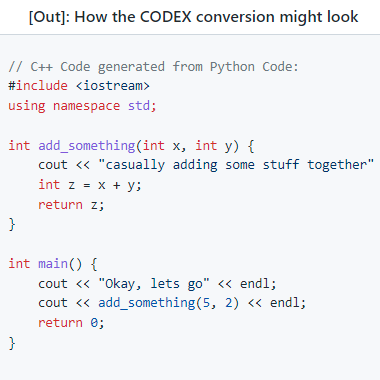[ad_1]
[Alexander] created codex_py2cpp as a way of experimenting with Codex, an AI intended to translate natural language into code. [Alexander] had slightly different ideas, however, and created codex_py2cpp as a way to play with the idea of automagically converting Python into C++. It’s not really intended to create robust code conversions, but as far as experiments go, it’s pretty neat.

Codex is an interesting idea, and this isn’t the first experiment we’ve seen that plays with the concept of using machine learning in this way. We’ve seen a project that generates Linux commands based on a verbal description, and our own [Maya Posch] took a close look at GitHub Copilot, a project high on promise and concept, but — at least at the time — considerably less so when it came to actual practicality or usefulness.
[ad_2]
Source link


